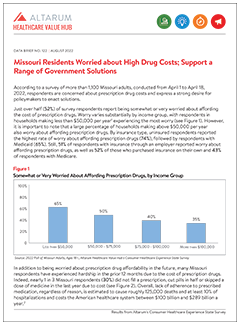Missouri Residents Worried about High Drug Costs; Support a Range of Government Solutions
According to a survey of more than 1,100 Missouri adults, conducted from April 1 to April 18, 2022, respondents are concerned about prescription drug costs and express a strong desire for policymakers to enact solutions.
Just over half (52%) of survey respondents report being somewhat or very worried about affording the cost of prescription drugs. Worry varies substantially by income group, with respondents in households making less than $50,000 per year1 experiencing the most worry (see Figure 1). However, it is important to note that a large percentage of households making above $50,000 per year also worry about affording prescription drugs. By insurance type, uninsured respondents reported the highest rate of worry about affording prescription drugs (74%), followed by respondents with Medicaid (65%). Still, 51% of respondents with insurance through an employer reported worry about affording prescription drugs, as well as 52% of those who purchased insurance on their own and 43% of respondents with Medicare.
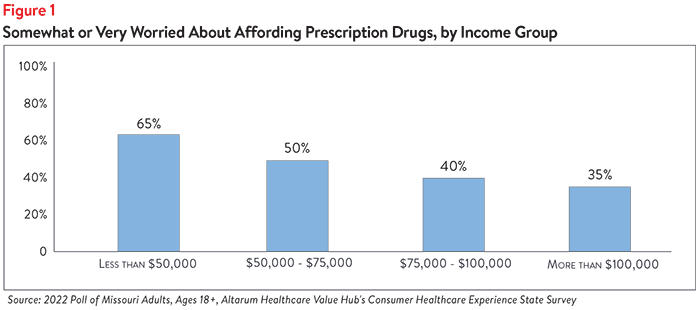
In addition to being worried about prescription drug affordability in the future, many Missouri respondents have experienced hardship in the prior 12 months due to the cost of prescription drugs. Indeed, nearly 1 in 3 Missouri respondents (30%) did not fill a prescription, cut pills in half or skipped a dose of medicine in the last year due to cost (see Figure 2). Overall, lack of adherence to prescribed medication, regardless of reason, is estimated to cause roughly 125,000 deaths and at least 10% of hospitalizations and costs the American healthcare system between $100 billion and $289 billion a year.2
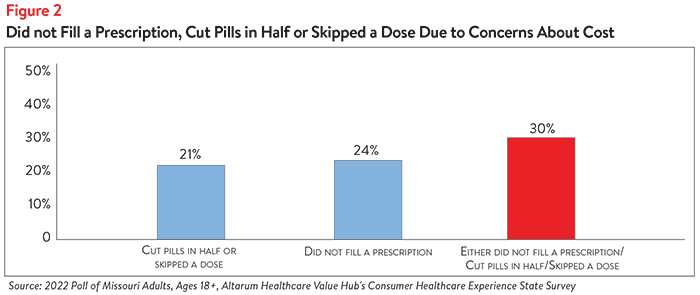
These hardships disproportionately impact people in lower-income households. As Table 1 shows, respondents living in households earning less than $50,000 per year reported higher rates of rationing their prescription medicines (by not filling a prescription, cutting pills in half or skipping a dose of medicine) than respondents living in high-income households. These hardships are alarmingly prevalent in middle-income households, as well. Uninsured respondents reported the highest rates of rationing medication by a large margin compared to other insurance types, followed by those with MO HealthNet (Medicaid). Finally, respondents living in households with a person with a disability reported notably higher rates of rationing medication due to cost in the past 12 months compared to respondents without a disabled household member.
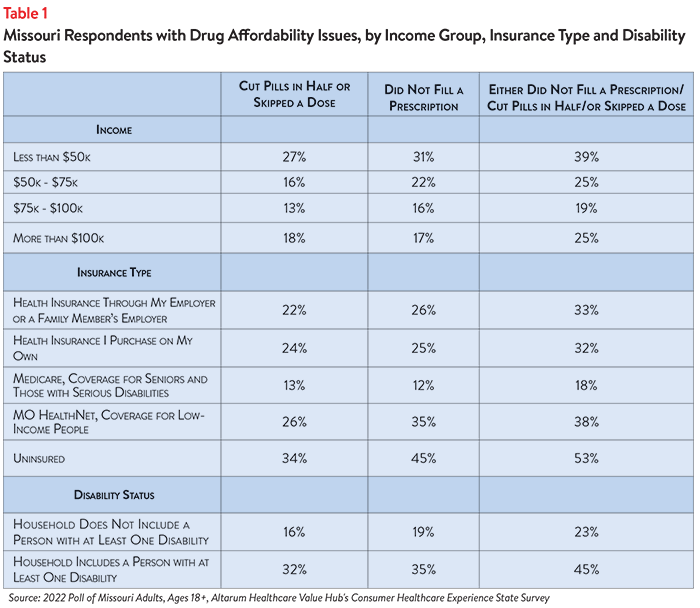
In light of these prescription drug cost concerns—as well as concerns about high healthcare costs generally3—it is not surprising that Missouri respondents were generally dissatisfied with the health system:
- Just 33% agreed or strongly agreed that “we have a great healthcare system in the U.S.,”
- While 71% agreed or strongly agreed that “the system needs to change.”
When given more than 20 options, the options cited most frequently as being a “major reason” for high healthcare costs were:
- 75%—Drug companies charging too much money
- 72%—Hospitals charging too much money
- 66%—Insurance companies charging too much money
When it comes to tackling high drug costs, Missouri respondents endorsed a number of prescription drug-related strategies:
- 92%—Authorize the Attorney General to take legal action to prevent price gouging or unfair prescription drug price hikes
- 91%—Require drug companies to provide advanced notice of price increases and information to justify those increases
- 90%—Set standard prices for drugs to make them affordable
- 89%—Create a Prescription Drug Affordability Board to examine the evidence and establish acceptable costs for drugs
- 88%—Prohibit drug companies from charging more in the U.S. than abroad
Moreover, there is substantial support for government action on drug costs regardless of the respondents’ political affiliation (see Table 2).
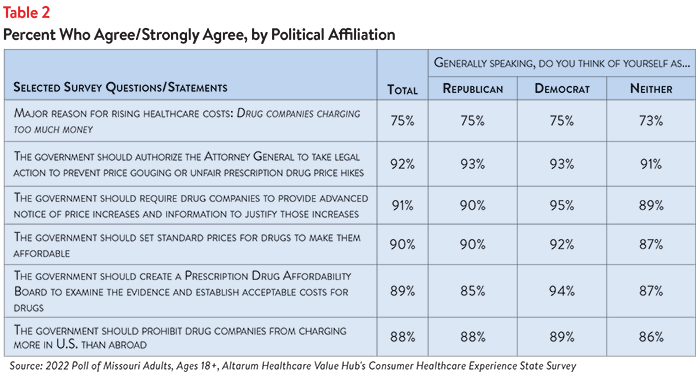
While Missouri respondents are united in calling for the government to address high drug costs, they also see a role for themselves:
- 81% would switch from a brand name to an equivalent generic drug if given a chance
- 59% have tried to find out the cost of a drug beforehand
Conclusion
The high burden of healthcare and prescription drug affordability, along with high levels of support for change, suggest that elected leaders and other stakeholders need to make addressing this consumer burden a top priority. Moreover, the COVID crisis has led state residents to take a hard look at how well health and public health systems are working for them, with strong support for a wide variety of actions. Annual surveys can help assess whether or not progress is being made.
Methodology
For the complete methodology, please see Missouri Residents Struggle to Afford High Healthcare Costs; Worry about Affording Healthcare in the Future; Cite Unfair Prices Charged by Powerful Industry Stakeholders; Support Government Action across Party Lines.
Notes
1. Median household income in Missouri was $57,290 (2016-2020). U.S. Census, Quick Facts. Retrieved from: https://www.census.gov/quickfacts/MO
2. Brody, Jane E., “The Cost of Not Taking Your Medicine,” The New York Times (April 17, 2017).
3. For more detailed information about healthcare affordability burdens facing Missouri respondents, please see: Healthcare Value Hub, Missouri Residents Struggle to Afford High Healthcare Costs; Worry about Affording Healthcare in the Future; Cite Unfair Prices Charged by Powerful Industry Stakeholders; Support Government Action across Party Lines, Data Brief No. 121 (August 2022).


